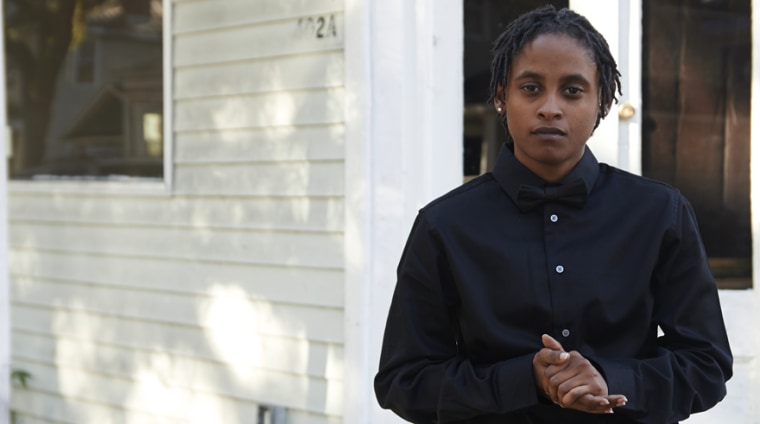Jameka Evans was discriminated against and effectively forced from her job as a security guard at Georgia Regional Hospital in Savannah because she is a lesbian and didn't conform to gender norms, according to the lawsuit she filed against her former employer in April 2015.
Evans and her attorneys at LGBTQ nonprofit Lambda Legal claim her termination violated Title VII of the 1964 Civil Rights Act — which prohibits discrimination on the basis of sex, race, color, national origin and religion — and they are hoping to take the case all the way to the U.S. Supreme Court.

After Evans’ case was dismissed by the U.S. District Court for the Southern District of Georgia, which maintained Title VII does not cover sexual orientation, her attorneys appealed the lower court’s ruling to the 11th U.S. Circuit Court of Appeals in Atlanta. The 11th Circuit dismissed the case earlier this year and then on Thursday denied a petition to have the case reconsidered.
Greg Nevins, director of the Employment Fairness Project at Lambda Legal, told NBC News the 11th Circuit’s decision not to rehear the case “came as a big surprise.” This is because his organization won a similar case in April, Hively v. Ivy Tech Community College, where the 7th U.S. Circuit Court of Appeals in Chicago became the first federal appeals court to rule that long-standing civil rights laws prohibit workplace discrimination based on sexual orientation.
Nevins said his organization now plans to appeal to the Supreme Court. While there is no guarantee the high court will take on the issue, Nevins said he believes the case stands a good chance, due to the discrepant rulings at the federal appeals court level. A decision as to whether the Supreme Court will choose to hear the case would likely come in early fall.
“[It’s a] compelling case for the Supreme Court to step in and correct this uncertainty in the law that hurts employers and employees,” Nevins said.
The 2nd U.S. Circuit Court of Appeals is also expected to hear a case regarding LGBTQ workplace discrimination in September. The case involves a New York skydiving instructor allegedly fired for being gay.
“The writing's on the wall with that one,” according to Anthony Kreis, a professor at Chicago-Kent College of Law, who said “it seems quite likely they will rule as the 7th Circuit did.”
If that is the case, according to Kreis, the odds of the Supreme Court taking on the issue would increase.
Importance of Timing
If the Supreme Court does indeed decide to take Evans’ case, exactly when it goes before the court could be a crucial factor in its outcome, Kreis noted.
“For the LGBT crowd, the earlier the better,” he said, citing the legal momentum of the issue and the composition of the Supreme Court.
“If Justice Kennedy leaves the Court and retires, the chances of success for these types of sex-discrimination claims at the Supreme Court diminishes significantly,” Kreis explained. “That might shut down this avenue for the foreseeable future.”
Nevins conceded that Justice Kennedy, who is rumored to be considering retirement, has been a “reliable vote” on cases pertaining to gay rights, but Nevins said he is optimistic about the more conservative justices, including newly confirmed Neil Gorsuch.
Kreis, however, said if Evans’ Title VII case reaches the Supreme Court, Gorsuch should be considered an “unreliable vote” when it comes to protecting LGBTQ people from discrimination.
“I’d rather have Justice Kennedy there,” he added.
Systemic Employment Discrimination
Instances of anti-LGBTQ employment discrimination are not isolated. Multiple studies have demonstrated the lesbian, gay, bisexual, transgender and queer community faces systemic employment discrimination. One in four lesbian, gay and bisexual Americans report having experienced employment discrimination on the basis of the their sexual orientation, and nearly 50 percent of transgender employees report discrimination in the workplace, according to the Williams Institute at UCLA School of Law .
In the absence of comprehensive anti-discrimination protections at the federal level, and with spotty protections at the state level, a ruling on anti-LGBTQ discrimination by the Supreme Court “would be incredibly meaningful for those who don’t have any other avenue to pursue justice,” according to Kreis.
“A number of detractors will [cite the failure to pass] the Employment Non-Discrimination Act (ENDA) as evidence that the courts shouldn’t do this, because Congress doesn’t intend for it,” Kreis said. But, he added, there has been no attempt to by Congress to amend Title VII to reverse the 7th Circuit’s decision in Hively v. Ivy Tech Community College.
“I think that’s an important signal to the Supreme Court if they take this up. There are very few voices out there at this point that are saying ‘No, this isn’t an appropriate role for courts,’” Kreis said. “There is nothing radical about what [Lambda Legal] is asking the court to do in terms of interpreting Title VII.”
Indeed, Nevins believes that should the Supreme Court rule in his plaintiff’s favor, the decision would be in line with “what America already thinks is the law, and America expects to be the law.”